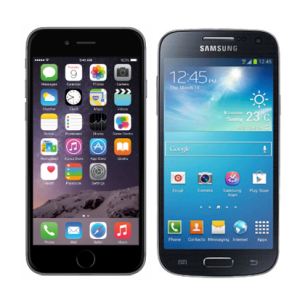The saga of patent warfare between Apple and Samsung continued in a California district court this week, where Apple asked for the immediate payment of more than half-a-billion dollars in damages upheld by a federal appeals court in May — a ruling Samsung is threatening to appeal all the way to the Supreme Court.
Apple sent a letter to Northern California U.S. District Court Judge Lucy Koh Tuesday requesting the federal court to order Samsung to pay $548 million to the Cupertino-based company for infringing on several iPhone patents.
The ruling originated in Koh’s court in 2012, and was upheld be the U.S. Court of Appeals for the Federal Circuit in May with the exception of “trade dressing” patents for the iPhone 3G. The three judge panel in D.C. threw out those aesthetic design patents, arguing they were simply ergonomic, and reduced Apple’s initial award of $930 million by $382 million.
RELATED: Why Apple’s Patent Win Against Samsung is a Loss for Consumers and Innovation
Samsung immediately responded this week by asking the California court to throw out a patent for Apple’s “pinch to zoom” functionality invalidated by the U.S. Patent and Trademark Office (USPTO) in December, according to the South Korean smartphone manufacturer. Samsung said the damages related to U.S. Patent No. 7,844,915 should be vacated and the court should stay any proceedings.
The USPTO invalidated another Apple patent for the front-facing design of the iPhone 3G on multiple counts earlier this month, also used in the lawsuit against Samsung. A petition by Apple to appeal the USPTO invalidity decision is pending at the office, according to court records. Apple can also appeal the decision to the Federal Circuit Court of Appeals.
RELATED: Apple Takes a Major Blow in Samsung Patent Fight
The Federal Circuit Court of Appeals denied an appeal by Samsung asking the court to review its decision in June, and the case was sent back down to the California court for a damages reassessment. Samsung has since said it will appeal the ruling all the way to the Supreme Court.
At the core of Samsung’s challenge is the court’s decision to award Apple damages based on the value of the company’s entire product — in this case, the entire iPhone — rather than just the value of the infringed patented features, like the iPhone’s front-facing design, user interface and utility features.
Samsung was ordered to pay the “total profit” of its infringing Galaxy products to Apple, making up the profit Apple lost in sales to Samsung Galaxy devices.
In its request for a review to the federal appeals court in June, Samsung argued letting the ruling stand would “invite overprotection and overcompensation for design patents, free from the limitations imposed in other areas of intellectual property law” and “lead to ‘an explosion of design patent assertions and lawsuits’” by patent trolls.
“Apple is blinding itself to the importance of this court’s rulings on design-patent scope and damages, and … that these rulings may well open the floodgates of design-patent litigation,” Samsung wrote to the federal court last week.
“Apple ignores the immense importance of the design-patent rulings in this case, which commentators recognize could usher in an era in which design-patent plaintiffs are the new patent trolls.”
Last month a coalition of major Silicon Valley companies including Google, Facebook, Dell and others filed an amicus “friend of the court” briefing with the U.S. Federal Circuit Court of Appeals siding with Samsung, and argued upholding the ruling threatens to stifle innovation and limit consumer choice across the tech sector.
RELATED: Silicon Valley’s Biggest Companies Take Samsung’s Side in Apple Patent Fight
“If allowed to stand, that decision will lead to absurd results and have a devastating impact on companies, including [the briefing draftees], who spend billions of dollars annually on research and development for complex technologies and their components,” the group wrote.
In its own filing to the federal appeals court last week, Apple accused Samsung of stalling the case and said the Supreme Court would likely refuse to hear the case.
Koh on Thursday ordered a stay on additional filings by either side, as the mandate from the federal appeals court hasn’t formally reached the California court yet.

